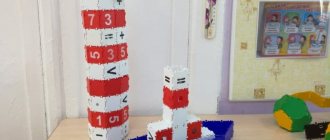The importance of role-playing games in the upbringing and development of a child
For a preschool child, play is a leading activity, a form of organizing life activity, and the main means of comprehensive development.
Starting from early preschool age, children show interest in play. However, they do not fully master gaming skills, and therefore children are very interested in playing with an adult. By middle preschool age, children already know how to play with each other; one of the most interesting games for them is role-playing game.
Definition 1
A role-playing game is a game that has a specific plot - a series of interconnected events and situations, and the roles that are distributed among its participants, and are the main core of the game.
Are you an expert in this subject area? We invite you to become the author of the Directory Working Conditions
Role-playing games are aimed at developing memory, thinking, imagination and personality in general in preschoolers.
The pedagogical value of a role-playing game lies in the fact that in addition to the relationships that are dictated to children by the plot of the game, other real and actual ones arise between them. During the game, children learn to interact with each other, understand how they relate to successes and failures, and learn to resolve conflict situations. The game helps the child overcome his timidity and embarrassment, and develops a variety of skills (work, play, communication, etc.), depending on the plot of the game.
Role-playing games teach children to independently establish relationships with the team and develop productive communication skills.
The game can be organized by a teacher who explains the plot to the children, assigns roles and manages the entire process of the game. The game can also be organized by children independently. When organizing the game independently, children themselves assign roles and follow the development of the plot. The game can be organized by children based on a fairy tale they read, a cartoon they watched, or the plot can be invented spontaneously (for example, a game of school, hospital, etc.).
Finished works on a similar topic
Course work Role-playing game, its role in the upbringing and development of a child 460 ₽ Abstract Role-playing game, its role in the child’s upbringing and development 260 ₽ Test work Role-playing game, its role in the child’s upbringing and development 200 ₽
Receive completed work or specialist advice on your educational project Find out the cost
In the process, role-playing games and joint play activities help children develop organization, responsibility, self-control and self-regulation skills, and consistency with the actions of other children. As the plot of the game develops, children acquire planning skills, creative imagination, initiative, activity, determination, etc.
Note 1
Thus, the role of role-playing games in the upbringing of a preschool child is very great, since it contributes to the comprehensive and complete development of the child’s personality and the formation of the necessary skills and abilities.
Types of role-playing games
When talking about story-based games, many people only think of “mother-daughter games” or “war games.” These are indeed some of the most common entertainments, but they are far from the only ones. Children's imagination is capable of simulating hundreds of variants of unique “theatrical performances”, where everyone can try on the role they like and convey its peculiarity and character. There are a lot of story-based games; they can be divided into several groups: staged, social, everyday, patriotic and based on the plots of literary works. Let's take a closer look at each type.
Staged
In such games, the child himself comes up with a scenario and, as a rule, speaks for all participants in the production. The basis is taken from fairy tales, cartoons or real life situations. Children teach dolls to act in accordance with the role assigned to them, endowing them with imaginary characters. The production type can be described in one phrase - “You are your own director.”
Public
This type of entertainment reflects people's work activities. For these fun topics, the themes are taken from the surrounding life and are based on the knowledge that the child has managed to acquire. Hospital, kindergarten, school, post office, hairdresser, circus, theater, house construction, police, firefighters - the list goes on and on. To become full-fledged, such classes require special “props”: thematic kits for a doctor, policeman or fireman, tools for creating hairstyles, cubes for constructing structures.
Household
Kids love to play family. They happily babysit, raise “children,” and organize holidays and birthdays. Often during the game, through dolls, children express what worries or worries them, and show relationships in their family. Take a closer look and listen to what the child says and what emotions he experiences. Maybe it's time to adjust your behavior and remove negative aspects from communication with others. After all, it turns out that the “unreasonable” child understands everything and is very worried.
Patriotic
It's hard to find a boy who wouldn't love to play war and feel like a hero fighting enemies. Such fun is necessary for the development of masculine character traits, familiarization with the concepts of “honor”, “duty”, “conscience”, “fatherland”. Of course, for entertainment of this kind you will need a whole arsenal of weapons: from medieval swords to modern blasters. The more diverse the weapons are, the more scenarios can be offered to the little defenders of the humiliated and insulted. They will be able to become epic heroes and fight against “filthy monsters,” brave scouts, fearless soldiers from the Second World War, or liberators of an unknown planet captured by evil monsters.
Based on literary stories
In these games, children live out entire episodes from read fairy tales, movies or favorite cartoons. They imitate the heroes and try on the characters' characters for themselves. The Wolf and the Hare, ninja turtles, fairy-tale princesses and courageous liberating warriors - thanks to children's imagination, they easily move from the pages of books, TV screens, theater stages to apartments and become characters in role-playing performances.
Kindergarten teachers often use didactic games, offering preschoolers types of stories that include elements of teaching the rules of behavior in society. Such activities allow you to quickly assimilate social relationships characteristic of the adult world and develop the correct reaction to various situations. Eg:
- After playing in the hospital, children will no longer be afraid of doctors. Make-believe classes at school will give you an idea of the interaction between teacher and student, rules of conduct in class, and will help you overcome your fear of the teacher.
- A game that takes place in a cafe will teach you how to behave properly at the table. This entertainment will also give you knowledge of how to beautifully set a table and use unfamiliar utensils.
- When buying goods in a makeshift supermarket, kids will be able to do this in a real store, and will also understand what the profession of a seller is and learn the names of many products.
- It is easier to learn the rules of behavior on the street, get acquainted with traffic lights in a playful way, dividing the roles of the traffic police inspector and pedestrians between children of the older group.
The socialization of children is an important task that can be easily solved with the help of play activities, but their influence on the child is much deeper. You can get acquainted with toys based on fairy tales in more detail in the corresponding section of the site.
What is fun for 5-6 year olds to play?
The games of middle and older preschoolers are characterized by the integrity of the plot and the interconnectedness of events.
A child of 5-6 years old is no longer interested in the game itself, but in the relationships between the characters. This is why children do not like to take on roles that are unpleasant or incomprehensible to them. At this age, children interact through speech, and games become very emotional. In games, dialogues are of great importance - it is with the help of them that interaction is established between the participants in the game.
The games of middle and older preschoolers are characterized by the integrity of the plot and the interconnectedness of events. The guys carefully select the plot of the game and plan its development. They react very emotionally and vividly to the events that unfold during the game. Here they show their creativity, imagine, invent.
The plot-play activity of a 5-6 year old child is characterized by:
- distribution of roles before the start of the game
- transition to role-playing actions that reflect the social functions of people
- a solid logical plot
What games might interest a 5-6 year old child?
- "In library"
- "Cosmonauts"
- "Providing medical care"
- "Family"
- “Circus” (“Magicians”, “Artists”)
- "In the cafe"
- "Trip around the world"
- "On the roads of the city"
- "Olympics"
- "In a workshop"
- "At a car service station"
- "Pharmacy"
- "Mail"
- "In airplane"
- "School"
- “At the Exhibition” and many others.
Watch a video about role-playing games in kindergarten
Remember that role-playing games in the life of preschoolers are a very important activity. In such a game, the child develops mental, creative and communication abilities. Encourage children to play and come up with new stories, help them.
Let's play at life
There is no game without a plot.
The plot is the main element of a role-playing game. There will be no game without it. The plot is the area of activity that children reproduce. While playing, a preschooler reproduces actions, events, relationships from life, while his play actions (examining a patient, preparing a pie, building a house, etc.) are the main means by which he realizes the plot. The plots of the games are different.
“Did you know that game plots change over time? Their content depends on the historical period, the state of the country’s economy, natural and geographical features of the area, and cultural traditions. There are also plots of games without time, for example, in “Hospital”, “Family”, “School”.
The next important element of the game is its content , which the child embodies through a certain role. The role is the main component of the game and the means of implementing the plot. A role for a child is his position. That is, the child, accepting a role, identifies himself with some hero and lives in the game according to the principle of conformity to this role, based on his own ideas. The role is based on rules of behavior that the baby borrows from the adult world, adopting the behavior of adults. Already at three years old, the child wants to act not only independently, but also like an adult.
One of the features of role-playing games is their social orientation
Features and benefits of role-playing games:
- Certain rules and their observance by children.
- Social orientation of games.
- Rich emotional palette.
- Development of intelligence.
- Active development of creativity.
- Speech development.
By playing role-playing games, the baby develops intensively and diversified.
The meaning of the game for a preschooler
In the game, the child practices communication skills
. The preschool period is the most important time for personality development. It is during these years that the baby receives his first knowledge about the life that surrounds him, he begins to develop his own opinion on what is happening, a certain attitude towards people and events, habits and behavior skills are formed, which forms the basis of his character. Much of the above is most often formed through play. It is through play that a child gains knowledge and develops communication skills, forms a worldview, expands his cognitive sphere of activity, and develops dexterity and discipline. Thus, the game becomes the best way for a preschooler to absorb information and social experience.
Role-playing games are of great importance for the development of a preschool child as a person.
“Role-playing games are games of a collective nature that develop children’s ability to communicate with peers.”
From about the age of three, role-playing games occupy a major place in the life of a younger preschooler. It is in this area that the child’s personality develops, the development of his cognitive processes is activated, and the foundations are laid for mastering new, more complex types of activities. While playing, preschoolers reflect in the roles they try on themselves everything they see around them: events, adult behavior patterns, etc. Participation in role-playing games allows the child to feel like a part of the children's team, to be critical of themselves and people.
Role-playing games: age characteristics and importance in a child’s life
Role-playing gives a child the opportunity to learn how to communicate effectively with other people, understand what is happening in the adult world, and also learn rules of behavior and general cultural and family values. He learns to step into another person's shoes, develops empathic skills, develops emotional intelligence, identifies with different people or characters, and develops new role models. With its help, a child can act out his feelings and experiences in difficult situations. Expert "Oh!" and child psychologist Anna Skavitina will talk about age-related features of the development of role-playing games.
Anna Skavitina, psychologist, analyst, member of the IAAP (International Association of Analytical Psychology), supervisor of the ROAP and the Jung Institute (Zurich), expert of the magazine “Psychologies”
In the kindergarten of the city N, they were waiting for a commission from the Education Department: the teachers were in a panic preparing a demonstration lesson - the role-playing game “Ship”, because all educators know that the leading activity for children is play. It is she who contributes to their development:
- in the game all mental processes are actively formed and rebuilt;
- the child learns to set a goal and follow it;
- children learn a large number of new words and expressions;
- conditions for the development of intelligence are created;
- the symbolic function of consciousness develops, especially when children use substitute objects: instead of an iron, a box of pencils;
- imagination is formed as the basis of creativity.
If the child is over three years old, then the best game for development and learning is role-playing. In it, children take on the roles of adults and, in specially created play conditions, reproduce the actions of their elders and their relationships, and also use objects that replace adult tools.
Before the commission arrived, at the command of the teacher, the children learned to build a ship from chairs, then they had to agree among themselves who played the captain, sailors, barmaid, dishwashers, passengers, cashiers, and then put everything back in its place.
And so the commission sat down on small chairs to watch and evaluate the success of the teachers’ work. The frightened children, at the teacher’s command, began to build the ship and prepare the props for the game. They assigned roles in advance so as not to quarrel in front of the commission. The game was going well until one small dishwasher had all her dishes fall overboard, and she went to collect them, climbing over the chairs (the side of the ship) straight into the open sea. The commission smiled at the girl, and she picked up the dishes from the floor and climbed back onto the ship. The pale teacher looked in horror at the child who had broken the whole game:
-Where did you go? Is there a sea there?
“The sea,” the girl agreed.
- Is it possible to collect dishes at sea?
“You can’t go into the sea, but you can do it from the floor,” she was confused.
“It’s impossible, it’s not the floor, it’s the sea,” hissed the teacher, imagining that she would definitely lose the prize.
- From the floor you can, even when it is the sea. What to play next if all the props drown? - said the most important woman in a suit and smiled at the girl.
It is quite difficult for adults to understand that an advanced role-playing game is a game in two worlds at the same time: in reality and in the imagination. The floor can remain a floor and immediately turn into the sea, or it can become the deck of a ship or space.
A developed child retains and distinguishes between reality and imagination, which is one of the most important functions of play; the teacher suggested that we immerse ourselves in the absence of differences, thereby losing control of reality. The child could not do this - and he did the right thing, since a complete loss of reality is psychosis, and not a game at all.
Children are regularly presented with demands that, due to their age, they cannot satisfy.
- Why don't you play yourself?
- Why don't you play with the guys?
- Why should I help you organize the game?
Let's look at the age-related characteristics of the development of role-playing games in children, so that fewer such demands are placed on the child.
Stages of development of a role-playing game
Imitation game
Children repeat in the game the actions that they saw in adults: rocking a doll, watering flowers, washing dishes, holding the phone to their ear and talking. Such games can be noticed in a developed child, who observes a lot of life around him, from about a year old. He imitates someone or something, but does not speak for the character: there is no imaginary situation, but there are game objects.
If adults spend a lot of time with a child, then from about 2-2.5 years old he moves on to simple role-playing games.
Simple role-playing game
The child acts out everyday situations that he often encounters: “Daughters and mothers,” “Shop,” “At a doctor’s appointment.” He tries on a certain role and tries to perform the actions that he saw in an adult; the child demands the same from his partners. In the game, role-playing behavioral stereotypes are learned, so each participant must follow the rules, for example : a child is a seller, an adult is a buyer; a child is a doctor, an adult is a patient. Often children strictly monitor this, so it is better for adults to do as required in a given game situation.
In simple role-playing games, the child talks a lot, even if he plays alone. It is better to participate in such games with two or three people; constant company is desirable for them.
To develop, a child must play. Every day. If the mother manages to find him a suitable partner in the person of the father, grandmother, nanny or older child, then she may, of course, not play. But mothers often don’t play because they don’t really understand the meaning of role-playing games, and also that playing them for a preschooler is much more useful than sorting out notebooks with copybooks and learning tasks.
Children who do not know how to play and do not play at 4-5 years old often have developmental problems - or these are children with whom they simply did not play enough: they find it more difficult to study at school, it is more difficult to make friends, they are more resistant to learning.
To promote the development of such games, talk through the actions of adults and their meaning in different situations when you are with your child. For example : “This is a doctor. He will now take your temperature to understand how you feel. The thermometer must be wiped with disinfectants. And now he will write everything down on the card so that the information is saved.” Such pronouncements additionally calm the child and allow him to feel competent if everything has been told in advance.
Role-playing game
An extended game with a sequence of actions. For example , “family trip”. First, the family packs their suitcases, then goes to the train station or airport, travels by train or flies by plane, arrives at a hotel or home, unpacks their suitcases, and their vacation begins: they go swimming in the river or sea, go on excursions and go to museums.
In such games, characters communicate, quarrel or make peace, roles are expanded and complemented, and children agree on what will happen next: “Let me be the pilot, and you the passenger?” The support of adults is important here, who teach how to deal with conflicts, help clarify the plot of the game, resolve controversial situations and participate in the preparation of props.
Children can act out unpleasant moments in life and even replay it the way they would like: the game helps them experience difficult emotions and cope with them, especially if an adult is included in it, who teaches different ways of living through emotional states.
For example : “She’s probably sad. Let her cry, and this character will feel sorry for her.” Through the game, parents can convey acceptable behavior to their child and explain how best to get out of a given situation.
Children with whom adults have played a lot easily become involved in role-playing games organized by adults at the age of 4-5 years, and from about 5 years old they begin to create such games themselves or together with their peers.
Role-playing games can be everyday ones , describing family relationships; public , allowing you to understand what representatives of different professions do; literary , when plots from cartoons, films, theatrical productions and books are acted out. It is best if children’s role-playing games cover all of the listed types.
Creative role-playing game
The child comes up with the plot himself and modifies it in the process. He may start from some life event, cartoon or computer game, but further develops with the help of his imagination. If no one bothers children and they have play partners, then they usually play throughout elementary school, thus helping themselves to learn new skills, as well as acquire and digest new knowledge.
Some parents are dissatisfied with the fact that their children are playing instead of sitting at home. They probably just don’t know that these games promote intellectual and emotional development.
In some schools, the entire educational process is built on role-playing games, because modern teachers have begun to realize that learning through play is possible not only for preschoolers.
Even adults are now learning using gamification—translating learning into games. This is by far the most effective strategy for teaching both children and adults everything from simple cooking skills to clarifying and developing economic business models. They learn languages by playing dialogues in pairs, participate in personal and corporate training, and play educational computer games.
The peculiarity of the role-playing game is that the student, regardless of age, is given the opportunity to act independently and freely in a specially designed difficult situation, and having gained experience, discover his ignorance without resisting, but by trying to find out what he did not know and achieve understanding. Adults who were not taught to play as children and who did not develop interaction patterns through play have a much more difficult time coping with social life.
Parents who actively play with their children make a huge contribution to their future and to their family, preventing emotional problems in children who find it easier to overcome difficult situations in communication and learning.





